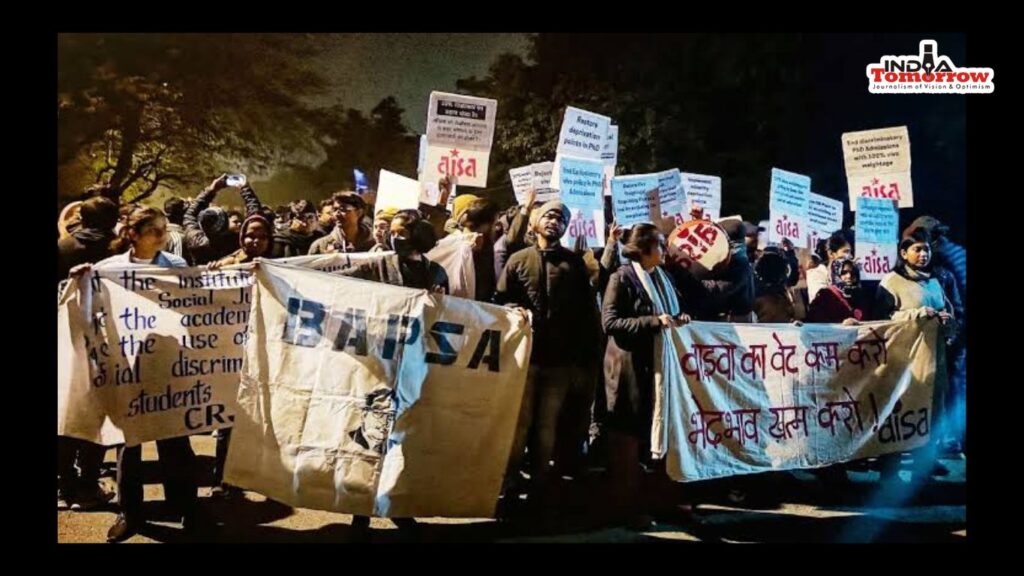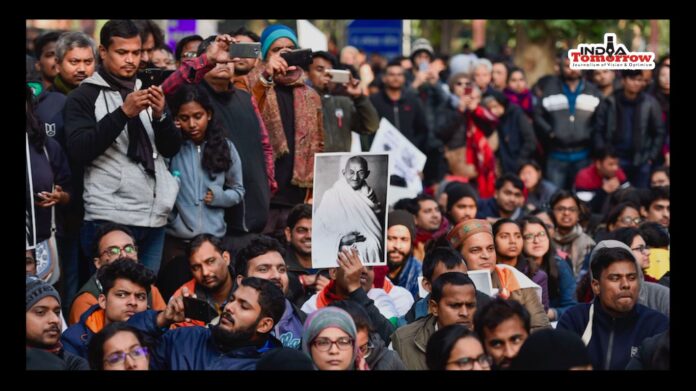By Arshad Shaikh
NEW DELHI: India has experienced a sharp decline in academic freedom over the past decade, with the “Free to Think 2024” report, published by Scholars at Risk (SAR), attributing much of this deterioration to the ruling Bhartiya Janata Party’s (BJP) attempts to enforce political control and push a Hindu nationalist ideology on universities. The report notes that India’s score on the Academic Freedom Index has dropped from 0.6 in 2013 to a dismal 0.2 in 2023, now placing the country in the category of “completely restricted”- its lowest standing since India’s independence in the mid-1940s.
Several universities have been forced to align with the policies of the ruling party at the Centre, silencing student dissent in the process. Jawaharlal Nehru University (JNU) barred protests near academic buildings, while South Asian University (SAU) went even further, prohibiting protests across the entire campus. The BJP-led Union government has also clashed with state governments over control of educational institutions. In Kerala, the central government appointee Governor Arif Mohammed Khan opposed state efforts to replace him as the Chancellor of state universities, leading to a legal standoff.
The impact of political pressure is evident in individual cases too. In July 2023, Ashoka University economist Sabyasachi Das resigned following backlash from BJP leaders over his research, which alleged political manipulation in the 2019 elections. The government’s intolerance extends beyond national borders as well—U.K.-based Professor Natasha Kaul was denied entry into India for her critical remarks on the RSS.
The international academic community has already raised alarms. Amartya Sen, the Nobel laureate, remarked that “intolerance toward opposing views in academia not only hampers national progress but weakens democracy itself.” Sen himself has faced hostility from right-wing elements, with campaigns questioning his involvement with educational institutions like Nalanda University. “An institution dies not with the end of funding but with the loss of free thought,” Sen once said in an interview, stressing the importance of intellectual freedom.
Political appointments in academic institutions are not limited to vice-chancellors and governing bodies. In several instances, faculty members have reported pressure to revise curricula to align with the Hindutva narrative. For instance, the decision to exclude references to the Mughal period or critical readings on caste from NCERT textbooks reflects an attempt to rewrite history from a majoritarian perspective. As historian Romila Thapar noted, “Erasing histories is not merely about changing syllabi; it is about altering the nation’s collective memory.”
At the same time, several universities have experienced administrative overhauls aimed at suppressing dissent. A prime example is Jawaharlal Nehru University (JNU), where changes in leadership have coincided with policies curtailing student activism. The administration’s decision to increase hostel fees sparked a massive protest, but instead of addressing students’ grievances, punitive actions followed. In one incident, JNU students were labelled “anti-national” on national television for voicing opposition to the government, a term which has since become a weapon to malign dissent.

This branding of dissenters as “anti-national” extends beyond student activism into faculty circles. The resignation of renowned scholars like Pratap Bhanu Mehta and Arvind Subramanian from Ashoka University underscores the chilling effect this climate has nurtured. Both cited increasing governmental interference and lack of institutional support as reasons for their departure, describing the environment as one where “freedom is conditional, and truth is dangerous.”
A key force driving these transformations is the Rashtriya Swayamsevak Sangh (RSS), the ideological parent of the BJP. Through its student wing, the Akhil Bharatiya Vidyarthi Parishad (ABVP), the RSS has expanded its influence across campuses, often clashing with left-wing student groups. The ABVP’s growing dominance reflects a shift in campus politics, where ideological conformity is increasingly rewarded, and divergent viewpoints are systematically marginalized.
In 2020, the RSS-backed ABVP disrupted screenings of documentaries critical of the government in multiple universities, citing them as “anti-India.” One JNU student, who requested anonymity, said, “You can’t discuss Kashmir, the CAA protests, or any controversial topic anymore without fear of backlash. Even professors hesitate to encourage debates.” This growing climate of fear undermines the essence of a university as an open space for the free exchange of ideas.
The steady defunding of public higher education also reflects a larger ideological motive. By starving universities of resources, the government pushes them towards privatization, aligning with the BJP’s neoliberal economic agenda. As education activist Anil Sadgopal noted, “Privatization, masked as reform, serves to dismantle public education, making it accessible only to the privileged elite.” The result is the gradual exclusion of marginalized communities from quality education, deepening socio-economic divides.
The government’s push for private universities, many with links to corporate allies, further illustrates this strategy. These institutions tend to avoid controversial subjects, focusing instead on market-driven courses. In doing so, they create graduates who are less inclined to challenge societal injustices or question political authority with individuals shaped more as compliant workers than critical thinkers.
Despite the bleak scenario, there remains hope in resistance. Faculty associations and student unions across the country are rallying to defend academic freedom. Protests at the Tata Institute of Social Sciences (TISS) and the University of Hyderabad (UoH) have drawn national attention, with participants demanding the rollback of administrative policies restricting free speech. “This is a fight for the soul of academia,” said one student protester at UoH. “If we lose this battle, we lose the ability to think freely and speak truth to power.”

There are also legislative and policy interventions that could help reverse the trend. Scholars like Gowhar Fazili have suggested amendments to the UGC Act, ensuring greater autonomy for academic institutions. Others propose that the Indian judiciary play a more active role in safeguarding academic freedom. The Kerala High Court’s recent judgment restraining the Governor from interfering in state university affairs is a positive step in this direction.
Additionally, the international academic community must continue to raise awareness about the situation in India. Global universities could consider making academic freedom a criterion for collaborations and exchanges, incentivizing Indian institutions to uphold these principles. The recent call by the Scholars at Risk (SAR) network urging governments to prioritize academic freedom in their diplomatic engagements with India is a welcome move in this regard.
As India stands at a crossroads, it must decide whether it wishes to remain a vibrant democracy or descend into authoritarianism. The health of a democracy is reflected in its universities – spaces where ideas can flourish without fear. If India is to uphold its constitutional promise of liberty and equality, it must restore academic freedom as a non-negotiable right. Political scientist Yogendra Yadav aptly summarized the situation: “The battle for academic freedom is not just a fight for universities; it is a fight for the future of democracy itself.”





